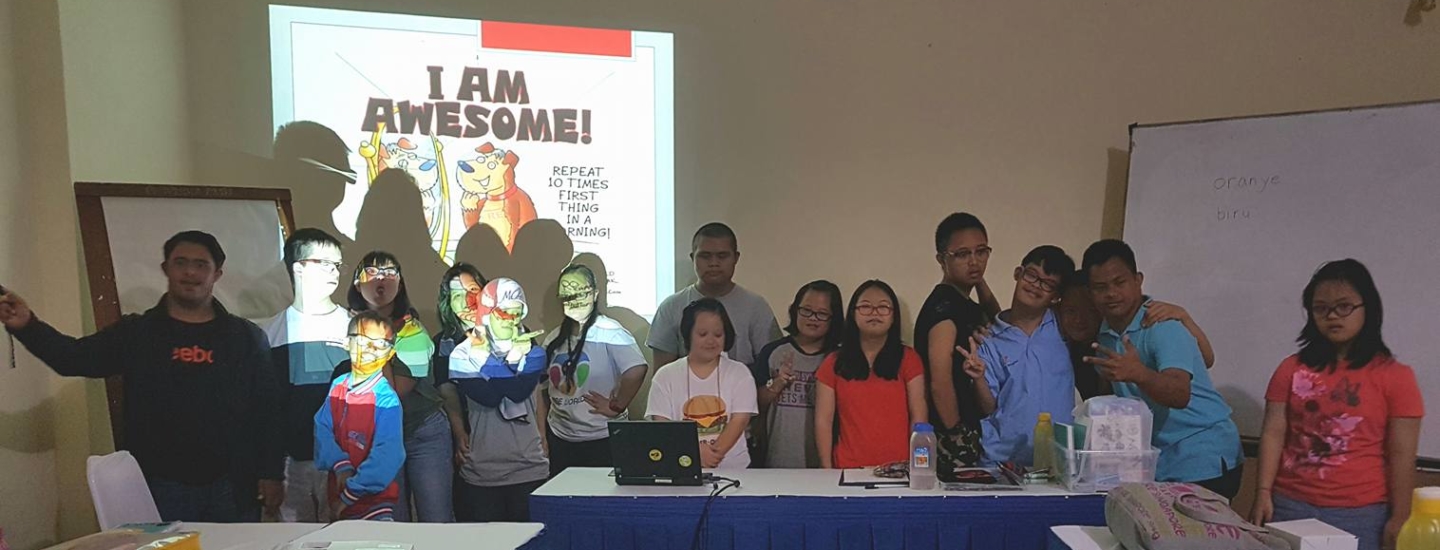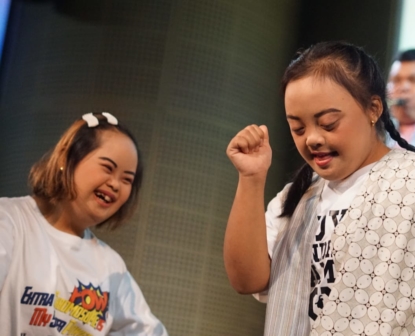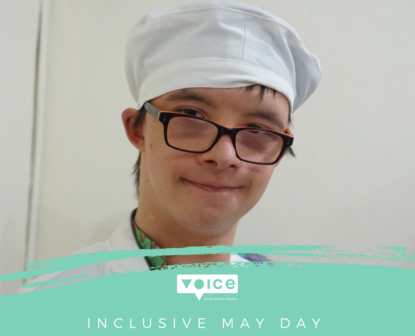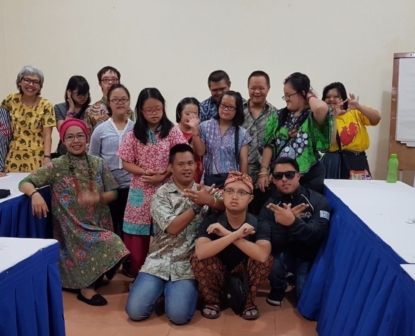Project
“Let’s speak up!” Phase 2
-
Amount Funded
55,995 EUROProject Duration
01 Sep 2018 - 31 Aug 2019 -
-
Lead organisation
YAPESDI
-
Down Syndrome Care Foundation Indonesia is a non-profit foundation that focuses its work on empowering youth and adults with Down Syndrome or other Intellectual Disability and their families. Vision: The realisation of a society which has a culture of being friendly, fair, and sensitive to persons who live with Down syndrome or other persons with intellectual disability and their families. Mission: 1. To build a Community (peer group) for adolescents and adults with Down syndrome; so they can be heard. 2. To educate adolescents and adults with Down syndrome to improve their ability to communicate, self-reliant, and to become self-advocates. 3. To cooperate with various parties and encourage the Government and private sector to conduct vocational education specifically for teens and adults with Down syndrome and other intellectual disability that can empower and enable them to find job or work so they will be able to support themselves economically and live with dignity. 4. To hold an intensive communication with parents and parties concerned with Down syndrome and support the activities of the Foundation. 5. To advocate for the community at large as well as the Government and the Parliament related to the vision of the Foundation. 6. To develop publications, information and documentation in many forms in order to increase the awareness of the community towards people with Down syndrome and other Intellectual Disabilities. For the time being the geographical coverage is only Jakarta. The uniqueness of YAPESDI is that they are not a parents’ organisation unlike other Down Syndrome organisations, but rather an organisation that cares about the people with Down syndrome and focus on the development and empowerment of this group of people so they will one day be able to organise themselves.
-
Organisation
Down Syndrome Care Foundation Indonesia is a non-profit foundation that focuses its work on empowering youth and adults with Down Syndrome or other Intellectual Disability and their families. Vision: The realisation of a society which has a culture of being friendly, fair, and sensitive to persons who live with Down syndrome or other persons with intellectual disability and their families. Mission: 1. To build a Community (peer group) for adolescents and adults with Down syndrome; so they can be heard. 2. To educate adolescents and adults with Down syndrome to improve their ability to communicate, self-reliant, and to become self-advocates. 3. To cooperate with various parties and encourage the Government and private sector to conduct vocational education specifically for teens and adults with Down syndrome and other intellectual disability that can empower and enable them to find job or work so they will be able to support themselves economically and live with dignity. 4. To hold an intensive communication with parents and parties concerned with Down syndrome and support the activities of the Foundation. 5. To advocate for the community at large as well as the Government and the Parliament related to the vision of the Foundation. 6. To develop publications, information and documentation in many forms in order to increase the awareness of the community towards people with Down syndrome and other Intellectual Disabilities. For the time being the geographical coverage is only Jakarta. The uniqueness of YAPESDI is that they are not a parents’ organisation unlike other Down Syndrome organisations, but rather an organisation that cares about the people with Down syndrome and focus on the development and empowerment of this group of people so they will one day be able to organise themselves.
-
Project
The second phase of Let’s Speak Up” is to continue and sharpen the ability of the class of teens with Down Syndrome to be able to speak up. YAPESDI was happy and proud of the progress made by 80% of the participants in the project first phase but still the ambitions were aimed higher at 100%. This was firstly due to the gap in the capacity of the participants, often implying a slow down in the pace of the teaching in order for one or two participants to catch up with the rest which at the end didn’t always help. Secondly, it was as a result of the commitment from the parents which weren’t as mutual as initially expected. This may be because of a lack of understanding on expectations. YAPESDI also found out that the parents weren’t all involved in the development process at home where the participants spent most of their time and had to practice what they learnt in class. The main success of the first phase was that the participants were happier and motivated to come to class and make a very open and good relationship with the coaches. Most of them are now able to introduce themselves happily, show off with a little bit of introduction what they are capable of. However, they still need more time to meet the criteria to advance in class so they can be coached as self-advocates later. The kids rarely have the opportunity to speak out and would not dare to do so anyway. This struggle to speak out is usually due to the way adults consider people with Down syndrome. Hence the second phase is to continue with the class with 10 participants from the previous class plus up to 5 others that YAPESDI met up along the way and thought that they have a similar capacity level with the other 10. They gather these youngsters on a regular basis and over time make them communicate with each other in a structured manner.
-
-
The second phase of Let’s Speak Up” is to continue and sharpen the ability of the class of teens with Down Syndrome to be able to speak up. YAPESDI was happy and proud of the progress made by 80% of the participants in the project first phase but still the ambitions were aimed higher at 100%. This was firstly due to the gap in the capacity of the participants, often implying a slow down in the pace of the teaching in order for one or two participants to catch up with the rest which at the end didn’t always help. Secondly, it was as a result of the commitment from the parents which weren’t as mutual as initially expected. This may be because of a lack of understanding on expectations. YAPESDI also found out that the parents weren’t all involved in the development process at home where the participants spent most of their time and had to practice what they learnt in class. The main success of the first phase was that the participants were happier and motivated to come to class and make a very open and good relationship with the coaches. Most of them are now able to introduce themselves happily, show off with a little bit of introduction what they are capable of. However, they still need more time to meet the criteria to advance in class so they can be coached as self-advocates later. The kids rarely have the opportunity to speak out and would not dare to do so anyway. This struggle to speak out is usually due to the way adults consider people with Down syndrome. Hence the second phase is to continue with the class with 10 participants from the previous class plus up to 5 others that YAPESDI met up along the way and thought that they have a similar capacity level with the other 10. They gather these youngsters on a regular basis and over time make them communicate with each other in a structured manner.
-
Let’s Speak UP! Enabling Teenagers with Down Syndrome to Speak Up: YAPESDI
Adults generally, and sometimes even parents of children with Down Syndrome (DS) carry the notion that those with DS lack the intellectual capacity to understand their situation or to even appreciate their own disability hence they are often profiled as human beings who cannot be educated or empowered. As a result, the people with intellectual disabilities suffer a difficult time integrating into society, a society that does not know their limitations or their capabilities. In a cyclic twist of fate, they are abandoned and excluded from society such that their understanding of life and the source of life is severely restricted and their capacity to integrate into that same society suffers.
In Indonesia as in most parts of the world, children with Down syndrome (DS) or more generally children with intellectual disabilities are almost never accepted by public schools, or even by the so called inclusive public schools. This situation obviously hinders the cognitive development of children with DS and curtails the evolution of their interactive skills such that they rarely have the opportunity to speak out and make their views known. Adults believing that the children do not need to know or that it is better they do not know end up preventing children with DS from asking questions thus silencing their voices and repressing their curiosity.
Down Syndrome Care Foundation Indonesia (YAPESDI) is a non-profit organization dedicated to empowering people with Down syndrome and other intellectual disabilities, as well as their families. Their vision is to create for people who have Down’s syndrome or other intellectual disabilities, as well as their families a public order that is kind, fair, and sensitive.
RIGHT TO SPEAK: Since 2018, YAPESDI has been implementing the Speak Up project with the objective of enlightening teenagers with DS to the reality that they have the right to think, speak their own language, and to be understood. The project focused on assisting people with DS to express their current worries, difficulties, societal limits, and how they deal with them, as well as their expectations for the future. The teenagers were guided and coached to become brave enough to speak up, communicate their views or opinions, and gain the confidence necessary to achieve this. They were guided to become self-advocates after passing this class. For example, in the run-up to the general election in 2019, training was conducted to emphasize the importance of using one’s right to vote, sensitization on why their voices matter as well as reasons why they needed to strive to convey the necessity of voting for the best candidate and push for the general election process to be held in a straightforward manner.
Yapesdi raised awareness and taught pupils with DS issues around sexual reproductive health rights (SRHR) since girls and women with intellectual disabilities are the most targeted victims of sexual violence. Yapesdi produced a module for coaching the SRHR program to youth with intellectual disabilities in the second phase of the project. The goal of the initiative was to improve their skills and confidence so that they as self-advocates could lead other youth with intellectual disabilities.
The project sought to bring together, unify, and empower teenagers and young adults with Down syndrome from across Indonesia and organize them in order that they could subsequently campaign and fight for the fundamental rights of persons with disabilities, particularly those with Down syndrome. It also hoped that they would be able to raise public awareness of diversity and protect the rights of people with special needs, particularly those with Down syndrome who are often excluded from decision-making processes that influence their lives.
Creating Impact: The efforts by YAPESDI did not go unnoticed and both the public and the government began to pay increasing attention to them. The fact that the DS community began to be acknowledged by others and invited to participate in events was one of the most stimulating social shifts for the organization. YAPESDI continues to be active in educational initiatives for children with intellectual disabilities and has received support from other international NGOs, foreign funders (DRF, NLR, HKI), and government agencies. Yapesdi has worked on an assessment with HKI, the government, and other NGO’s working on education for children with disabilities, as well as experts in education and industry sectors to see if a module for SMK (vocational high school) could be developed to better integrate persons with intellectual disabilities into the SMK.
Persons with DS are frequently invited to join in events, shows, and other activities. When there are possibilities, such as competitions, jobs, or showcases, the project participants are among those who have been picked. They take on the role of self-advocate for their problems. Notable mentions include the following:
In March 2019, Yapesdi attended the United Nations Office in Geneva for World Down Syndrome Day, where Morgan, one of the project luminaries, spoke about the employment situation for people with Down syndrome in Indonesia.
Two of the project’s weekly class participants placed first and fourth in the Ministry of Women Empowerment and Children Protection’s “Speak Out Your Problem” competition. On the same day in Palembang, one was invited to give a motivational closing remark to encourage other children and parents with disabilities to never give up and to strive for a good life. Two more people were chosen as models for the Seribu Paras clothesline while Four were selected for an internship with Garuda Indonesia’s Corporate Social Responsibility department.
Yapesdi was asked to pitch at the Now-Us! Award in The Hague, Netherlands, where Morgan again pleased the judges. Despite the fact that Yapesdi did not win the award, several people were impressed by the project.
While looked at in isolation, these achievements might only be considered as little gains but the bigger picture is that these contribute enormously towards shifting attitudes on how young people with intellectual disabilities are treated and opens the door for practices that will make it easier to embrace them in the public eye and accord them equal opportunities in the community.
They participated on DSI WDSD with theme #leavenoonebehind video viewing, our class video could be viewed on this link :
The activities around celebrating Down syndrome day could be seen on this link :
https://drive.google.com/open?id=10DXoSfHTEICGjPQAHZtFs99kuPfOkKcS
Each of the participants showed progress on their abilities to speak up and more and more are eager and have more gut to come forward. The photos and videos of the participants progress could be seen on:
https://drive.google.com/drive/folders/1u4WgrSfP80-JCQehhU1h-xEVhwUaN57H?usp=sharing
We were appointed as one of the juries in Ministry of Women Empowerment and Child Protection’s event: “Suara Anak Disabilitas” in Palembang, June 2019.
2 of our students gained first and fourth position for the “Speak Up your problem” competition. And at final event Morgan been asked to make a closing statement of the ceremony. The photos of the event could be checked here:
https://drive.google.com/open?id=1VAgDCWy2GzQDZZ19Aou0NvUGXDuVKRep
The weekly class and monthly activities could be viewed here:
https://drive.google.com/open?id=19epzHmTCVQdPSB3f6WxkYEOneo_90Orf
Our project was nominated for Now-Us!Award 2019 thus made us the first Voice grantee from Indonesia been nominated for the award. Pictures during the one-week event in The Netherland (The Hague and Amsterdam) could be seen here:
https://drive.google.com/open?id=1VDRs-rKC8fRMUR35Z4ZrNCsvTiJeCE7r
Our first public event pictures “Pentas Seni dan Diskusi Publik” held in prestigious Galeri Indonesia Kaya could be viewed here:
https://drive.google.com/open?id=1R5v398QVaUCPfHFwcqHeW250C-it4MRF
And a snapchat video of the event could be seen here:
https://drive.google.com/open?id=1-RTDPZ8NS-_iCH13NpKjYzOfKW1GokaS
The event was featured in national TV Berita Satu, and could be viewed here:
https://drive.google.com/open?id=1EIkjZ9Nq4bOUbtBXmgJEsCNfORrevn74
The module could be read here:
https://drive.google.com/open?id=1veUsTqvP9YwIY74Oo50uMtwsw21Hhir6
https://drive.google.com/open?id=1YYgybkljPO5HcB5ENO_Fuhx5s4JI0km6
-
News






